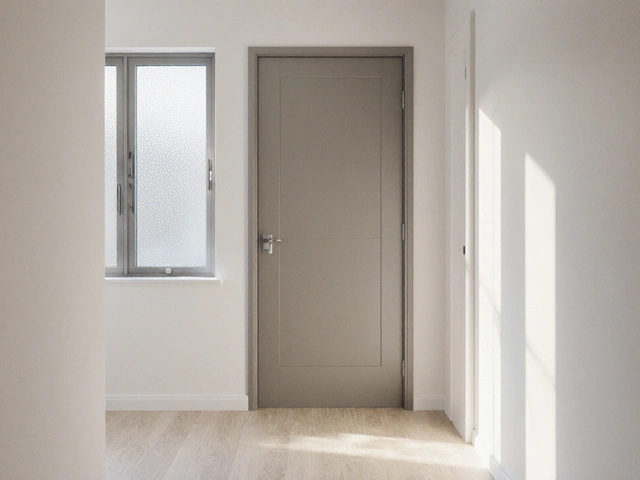
Picture this: You finally decided to take the plunge on that dream kitchen or major office revamp. You saved for ages, you scrolled reviews until your thumb hurt, and yet one question’s nagging at you—who can actually be trusted to do the job right? In the world of construction, hiring the wrong contractor can drain your wallet and test your patience, sometimes with horror stories that sound like something out of a sitcom. With over 700,000 construction companies and millions of handymen hustling from Maine to Maui, it's wild how finding someone reliable can feel like playing the lottery. So, who really is the best contractor in the USA? Let's pull back the curtain.
Defining the Best: What Makes a Contractor Stand Out?
The word "best" gets tossed around everywhere, but it’s slippery when it comes to contractors. Is it about finishing on time? Staying on budget? Or, maybe it’s that magical touch where they show up when they say they will (rare, right?). The truly great contractors didn’t just land here by luck; they’ve built their reputations, brick by brick, by nailing the basics and owning their craft.
First off, licensed contractors are non-negotiable. In California, for example, a report by the Contractors State License Board from March 2025 showed that projects completed by licensed pros had a 71% higher satisfaction rate than unlicensed counterparts. Why? Licensed contractors are held to a much higher standard when it comes to safety, laws, and ethics.
Transparency is another sign you’ve found someone top-tier. The best contractors lay out costs, explain timelines, don’t bury ugly surprises in jargon-packed contracts, and send you photos or updates without you begging. These folks also carry solid insurance, so you’re not left hanging if one of their crew slips on your icy driveway. They pull proper permits—which matters more than you’d think. Recent stats show that over 24% of costly, drawn-out disputes with contractors in the U.S. come from skipped or mishandled permits. Ever seen that little red "Stop Work" sign taped to a neighbor’s door? Not fun.
Now, don’t underestimate how much communication matters. The "best contractor in USA" could have incredible technical skills, but if you’re stuck waiting for days on a return call, or you can’t get a straight answer on when your old cabinets will finally disappear, the project will feel like a disaster. The pros who own online reviews (think 150+ reviews, averaging 4.8 stars and up) don’t just get the details right—they’re people you can stand to talk to, and maybe even trust with the spare key. Years in business helps too; a guy who’s been around for two decades, with a real track record and photos to prove it, gives off a different vibe than that cheap flyer left on your windshield.
Here’s the clincher: The top contractors adapt with the times. Post-pandemic, more have gone digital, adding project management apps so you see updates in real time, sign documents from your phone, and check in without awkward phone tag. A 2025 survey by Houzz showed that 63% of homeowners preferred contractors who offered transparent digital options over those who relied only on paper contracts and in-person meetings.
The Big Names: National Standouts and What Sets Them Apart
When you dig into the list of nationally recognized contractors, a few names consistently show up for all the right reasons. Folks like Turner Construction, Bechtel, and The Whiting-Turner Contracting Company aren’t just building sky-high offices; they’re setting industry standards for safety, sustainability, and handling monster-sized budgets. For home renovations and residential builds, you’ll spot companies like Power Home Remodeling and PulteGroup topping 2025 rankings—not just for flashy ads, but for decades of reliable work and glowing client feedback.
But do the big players always make sense for your job? If you’re adding a bathroom or fixing a backyard fence, hiring a multinational giant is like using a flamethrower to toast marshmallows. For most of us, local legends—think small family businesses or independent contractors—are who we actually call. These companies, although less likely to show up in glossy magazine rankings, often outscore national chains for responsiveness, price flexibility, and hometown know-how. A 2024 HomeAdvisor report revealed that 72% of highly satisfied homeowners picked a local contractor who came recommended by friends or neighbors rather than a national franchise.
Let’s not skim past the little guys just because they don’t have billboards on the freeway. Some of the best remodeling experiences come from one-crew outfits or owner-operated shops. They grow by word of mouth, not Yelp SEO, and you’ll usually deal with the same person from first handshake to final walkthrough. That means mistakes get fixed fast—because their reputation is on the line every single day.
Curious just how these companies compare? Check out this snapshot from ENR’s 2025 Top U.S. Contractors, showing residential and commercial juggernauts and the projects they’re most known for:
| Company | Specialty | 2025 Revenue (in billions) | Avg. Customer Rating (out of 5) |
|---|---|---|---|
| Turner Construction | Commercial/Broad Range | $16.6 | 4.7 |
| Bechtel | Industrial/Public Projects | $18.4 | 4.5 |
| Power Home Remodeling | Residential Remodeling | $1.1 | 4.8 |
| PulteGroup | New Home Builds | $15.2 | 4.6 |
| Whiting-Turner | Commercial/Education/Healthcare | $12.9 | 4.7 |
Eye-popping revenue and high ratings don’t make these giant firms easy to work with for a kitchen facelift, but they set industry benchmarks that smaller outfits try to match locally.

Tips for Spotting a Great Contractor (And Avoiding Nightmares)
Tales of nightmare projects are practically American folklore now—busted budgets, jobs left half-finished, and crews that vanish once you’ve paid 80% of the bill. But the "best contractor USA" stories—the ones where you actually love the result—always have a few common threads. Let’s cut through the noise with simple, field-tested tips for spotting the champs, not the chumps.
- Check that license and insurance. Don’t just take their word—your state’s contractor license board usually lets you look up a company in minutes. If they dodge the question, run.
- Beware the lowest bid. Many disasters start because the cheapest offer cuts corners (or corners you didn’t even know existed). Request a detailed breakdown. A great contractor will explain where the money goes.
- Review the portfolio. They should have before-and-after shots, not just one blurry kitchen from 2015. Bonus points for recent references you can actually call.
- Clear contracts only. If it reads like an ancient scroll or buries key facts, ask for plain English. Look for breakdowns of payment schedules, materials, change orders, and timelines.
- Test their responsiveness. Send a few emails or texts with questions. If they go radio silent, keep looking. Good communication almost always equals better project results.
- Ask about subs and crew. Will the owner be hands-on? Or will a whole new cast show up each week, leaving you wondering who’s in charge?
- Research online reviews but cross-check them. Too perfect? Too shallow? Sometimes, review fraud is real—look for detailed, believable stories, not generic raves.
Here’s a pro tip: Watch out for contractors who ask for huge upfront payments (over 25%). In some states, it’s even illegal. The 2025 Consumer Federation research found that the majority of scam cases started with big deposits and little paperwork. You want someone who’s invested in finishing the work, not just grabbing your check.
Some helpful tools are on your side: Try Angi (formerly Angie’s List), HomeAdvisor, or even Nextdoor for neighborhood picks. And never fear asking, “If we hit a snag, what’s your plan?” The best contractors have an answer. Or, they’re honest enough to admit when they don’t—which usually means they’ll work twice as hard to make it right.
Regional Standouts: Where to Look for Hidden Gems
America’s spread is massive; a contractor that dominates in New York might flop in Texas just because building codes, supply chains, and even weather are so different. Seasoned pros will tell you that “the best contractor USA” is usually someone who knows the quirks of your zip code as well as you know the back roads home. This is even more true when dealing with climate-specific builds—think hurricane-resistant roofs in Florida, or energy-smart insulation in snowy Vermont. Local word-of-mouth really works here, and you can sometimes spot award-winning local contractors in your city’s “Best Of” lists in local press or trade mags.
What sets these regional contractors apart isn’t just skill, but relationships—with city inspectors, suppliers, and crews who have fixed those same wonky 1920s bungalows or built hundreds of sunrooms in your neighborhood. Many even partner with local shops and small manufacturers, so you’re pumping money back into your area instead of sending it off to a chain HQ four states away.
There’s a growing trend, too, with regional firms specializing in niche markets. In the Pacific Northwest, contractors who focus on green building or Passive House-certified homes are booming, while the South sees a spike in storm-smart retrofits and ADU (Accessory Dwelling Unit) specialists. Stats from the National Association of Home Builders (2024) show that regional specialists score 24% higher in project completion speed than big chains working out-of-state. If you care about custom details or want someone who “gets it” when you mention that weird swampy patch in your yard, shop local for the best odds.
Don’t forget about regional trade associations—many keep a roster of vetted and award-winning contractors that help weed out fly-by-night operations. Even better, these local pros often show their loyalty by giving back, like offering free repair clinics or supporting area schools. That’s a win for more than just your house.

Red Flags, Hidden Costs, and Secrets Pros Want You to Know
If you want that dream renovation to finish strong, seeing red flags early can save your sanity (not to mention your budget). Veteran contractors whisper about the biggest risks: contractors who only give verbal estimates, ask you to buy all the materials at full retail, or pressure you to sign on the dotted line that day "for a special price." Those shortcuts almost always come back to bite.
Here’s a real shocker: A 2025 Home Remodeling Watchdog survey showed that 33% of homeowners hit with surprise bills during renovations never saw those costs spelled out until the job was almost done. Many pros warn about sneaky upcharges for “unforeseen conditions”—so always get an itemized contract and ask what’s not included upfront.
Hidden costs can hide everywhere: permits, dump fees, even that fancy faucet that needs an hour and three plumbers just to install. Experienced contractors won’t shy away from explaining where things might go sideways. If someone’s timeline sounds way too optimistic, they’re likely glossing over this stuff or are too green to know better themselves.
Another pro secret: Great contractors value your referral as much as your check. If they did amazing work, don’t be surprised if they ask you for a testimonial, a review, or to let a future customer peek at your finished space. Contractors who build reputations on word of mouth are the least likely to cut corners—because they're betting on your satisfaction nabbing them their next gig.
Lastly, don’t rule out the little extras: A contractor who calls a month after finishing, just to check that everything’s holding up, is gold. These follow-up calls and warranties speak louder than most contracts ever could, and show you’ve found someone who actually cares about the lifespan of their work, not just bouncing to the next project.
So, who’s the best contractor in the USA? It’s not just Turner Construction or the local handyperson your neighbor can’t stop talking about—it’s someone who’s licensed, transparent, communicates clearly, and builds relationships where you live. You’ll know you’ve found them when your next project actually feels exciting, not nerve-wracking, and you’re proud to show it off at the next BBQ. That’s as good as it gets.




